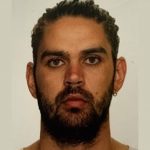
Nathan Hawke
Indigenous Health Scholarship
Monash University, VIC
Bachelor of Paramedicine
Scholarship Awarded 2022-2024
Sponsored by:
Rotary District 9790 Group
How will I contribute to improving Indigenous health as a qualified medical practitioner or health worker?
No one ever calls a paramedic when they are happy. Paramedics are called upon in distressing times, when someone needs vital, time critical, emergency support. Yet when an Indigenous person is facing such times, they are less likely to call for help due to a general distrust form emergency services. This puts our Indigenous population – my mob – at a greater risk of severe injury or death. As a front-line health worker, I want to change this and I want to change the stigma attached to emergency services among the Indigenous community. This is how I hope to improve Indigenous health as a qualified medical practitioner.
By becoming a paramedic, I will be an Indigenous front-line worker, solving problems as they unfold. Though this means I am not necessarily implementing upstream interventions, I believe my experience as an Indigenous paramedic can be utilised to help our profession further improve Indigenous health, and upstream interventions as a while. Also, as a paramedic we can refer to secondary Indigenous health services. This allows for engagement even after the call out. I am in a privileged position as a first responder to show understanding, empathy and compassion towards our mob, and also develop a repport by understanding cultural differences.
Through this career path, I want to be a role model amongst my community and I want to show that paramedics can be trusted when help is needed. I hop to engage with my mob, volunteer at Indigenous community centres, and volunteer my time to further my long-term goal of improving the health of our First Nations people. Through these engagements, I would like to show that paramedics can be role models and friends. This will not only help our Indigenous people of today, but it will break down barriers for further generations.
Current Progressive Report
As I’ve made it through the first semester of 2024, I am now entering my final semester of university for my Bachelor of Paramedicine. Last semester brought some challenges as the workload was intense and covered a broad range of subjects.
In maternity, we learned about birth and the development of the fetus through the stages to expulsion. During placement, I was fortunate enough to be part of a birth with a midwife at the hospital, where I even got to cut the umbilical cord.
Semester one included a lot of placement time spread over the 12 weeks, allowing me to see, learn, and experience many interesting things. One of the highlights was watching open-heart surgery at the Monash Heart Hospital, where I was allowed to be in the room and observe the procedure.
The next 12 weeks of the final semester will fly by. It will be an exciting time, but I will also need to knuckle down and tackle this last hill on the journey I have been through so far.
As for the future, currently with ambulance Victoria it’s over a year wait time for a job so there is the potential to look interstate for opportunities. Though my partner and I do want to stay in Victoria as we have set up roots here. When waiting for a job I may investigate other health care job avenues to put into practise the skills I have learnt and developed over the last few years.
Further down the track I can see myself getting to aboriginal health advocacy whether that’s through ambulance Victoria or other avenues.